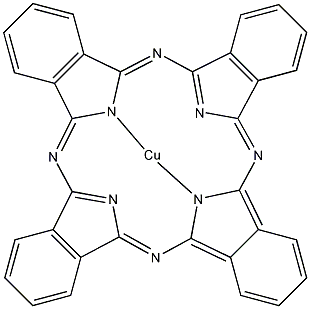Copper phthalocyanine


Structural formula
| Business number | 03X3 |
|---|---|
| Molecular formula | C32H16CuN8 |
| Molecular weight | 576.07 |
| label |
Phthalocyanine blue, β-type phthalocyanine blue, Stable phthalocyanine blue, 4352 Phthalocyanine Blue BG, 4402 Phthalocyanine Blue FBG, 4382 Phthalocyanine Blue BGS, Phthalocyanine blue PHBN, Phthalocyanine blue, Fast blue FGX, hostaperm blue AN, Raw materials and intermediates used in ink |
Numbering system
CAS number:147-14-8
MDL number:MFCD00010719
EINECS number:205-685-1
RTECS number:GL8510000
BRN number:4121848
PubChem number:24878913
Physical property data
1. Characteristics: bright blue crystal. There are two crystal forms, α and β. Type β is more stable.
2. Melting point (ºC): 600ºC3. Solubility: Insoluble in water and organic solvents.
Toxicological data
2. Toxicological data:
1. Acute toxicity: Rat oral LD: >15 gm/kg;
Rat intraperitoneal LD: >3 gm/kg .
Main irritant effects:
On skin: May cause inflammation.
On eyes: May cause irritation.
Sensitization: No known sensitizing effects.
Ecological data
3. Ecological data:
Usually it is not harmful to water. Do not discharge materials into the surrounding environment without government permission.
Molecular structure data
None
Compute chemical data
1. Reference value for hydrophobic parameter calculation (XlogP): None
2. Number of hydrogen bond donors: 0
3. Number of hydrogen bond acceptors: 0
4. Number of rotatable chemical bonds: 0
5. Number of tautomers: none
6. Topological molecule polar surface area 98.9
7. Number of heavy atoms: 41
8. Surface charge: 0
9. Complexity: 1180
10. Number of isotope atoms: 0
11. Determine the number of atomic stereocenters: 0
12. Uncertain number of atomic stereocenters: 0
13. Determine the number of chemical bond stereocenters: 0
14. Number of uncertain chemical bond stereocenters: 0
15. Number of covalent bond units: 2
Properties and stability
1. Stable under normal temperature and pressure. Soluble in 98% sulfuric acid, insoluble in water and alcohol. Decomposes in hot nitric acid and is used as a pigment in inks and paints.
Storage method
Store sealed in a dry and cool place.
Synthesis method
1. The synthesis method of this product; Mainly used for coloring inks, coatings, plastics, rubber and cultural and educational supplies.
2. Used in various solvent-based paints, plastic inks, gravure printing inks, and quick printing inks.
3. Stable β-type green light blue, good dispersion, high hiding power, used in alkyd resin paint.
4. Used for coloring inks, paints, plastics, rubber, paint pastes and synthetic fiber pulp.
5. Unstable α-type red light blue, strong tinting power, can be used in latex and water-based coatings.
6. Used to make peacock blue ink, used for coloring alkyd paint, etc., and also used for coloring plastic products, cultural and educational supplies, etc.
8. Used for coloring paint, spray paint, ink, plastic, and rubber.
9. Mainly used for ink, iron printing ink, paint, painting watercolor, oil paint and paint printing, as well as the coloring of rubber products and plastic products.
10. is the main variety of blue pigments and is mainly used as a colorant in adhesives. The particle size for practical application is generally 0.01~0.1μm, and a particle refinement process must be carried out. The purpose of pigmentation processing is to change the crystal form and reduce the crystal particles. Methods include acid treatment and salt grinding. Mainly used in the ink industry to manufacture peacock blue ink, which is the main variety of four-color plate printing ink. In the coatings industry, it is used in the manufacture of alkyd enamels, amino baking varnishes, nitrocellulose lacquers and the coloring of clear lacquers. It is also used for coloring plastics, rubber, cultural and educational supplies, linoleum and paint printing, etc.